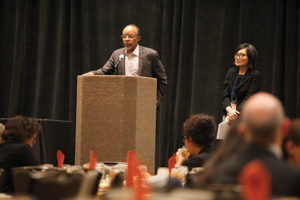 Michael DeBaun, MD, MPH, the keynote at Saturday’s ATS Diversity Forum, has a list of accolades. Professor of pediatrics and medicine, JC Peterson Endowed Chair, vice chair for clinical research in pediatrics, and founder and director of the Vanderbilt-Meharry Center of Excellence in Sickle Cell Disease at the Vanderbilt University Medical Center—it’s a mouthful. At 59, he has the freedom to look back and advise the next generation of leaders about what diversity means in the medical community.
Michael DeBaun, MD, MPH, the keynote at Saturday’s ATS Diversity Forum, has a list of accolades. Professor of pediatrics and medicine, JC Peterson Endowed Chair, vice chair for clinical research in pediatrics, and founder and director of the Vanderbilt-Meharry Center of Excellence in Sickle Cell Disease at the Vanderbilt University Medical Center—it’s a mouthful. At 59, he has the freedom to look back and advise the next generation of leaders about what diversity means in the medical community.
It’s a balance, Dr. DeBaun said, between “individual activity and academic activism.” He broke down his own career into phases, demonstrating for attending students and young professionals how he has grown into his own role as an academic activist.
“It’s about choosing the right time and the right purpose,” he said. It can be hard to focus as much on activism when you’re still busy learning the ropes.
“When you work as an academic fellow, it’s difficult to believe that, as a neophyte, you can walk in and effect change,” Dr. DeBaun said.
Between 1996 and 2003, he estimates he was just learning the status quo. He observed the absence of programs for children with Sickle Cell Disease (SCD)as an assistant and associate professor at Washington University during those years. There was a lack of community awareness about the disease, particularly in the African American community.
Dr. DeBaun’s academic activism began with making sure SCD patients and their families had a hospital-provided social worker, a resource that had been disproportionately lacking.
As time passed, he became increasingly agitated with the status quo. His self-described “mid-life crisis” hit in 2010.
“I was then unwilling to accept the status quo,” said Dr. DeBaun. Care for patients with chronic diseases is limited to patients with access to that medical care. It’s a luxury that many SCD patients can’t afford. In 2010, he founded the Vanderbilt-Meharry Center of Excellence in Sickle Cell Disease to give patients in mid-Tennessee access to care.
He later expanded his SCD care and research to northern Nigeria, working to establish new maternity care for women with SCD in a clinic at the Korle-Bu Teaching Hospital in Ghana.
Dr. DeBaun attributes much of this career success and increased activism to self awareness.
“Know who you are, and be true to yourself,” he told a student who asked how to become involved in activism. “That takes a lot.”
He noted that activism canalso be a gradual journey.
“You can always make a contribution, and it doesn’t have to be in the way that I just described. It can be in many other ways,” he said.
He said he believes that the next generation is going to take activism and diversity in the medical community to an entirely new level.
“When millennials go to medical school, they will continue to change the landscape. They’ll be more sensitive,” he said. “I’m hoping that [this community] will be more organic and less of an old boy’s club.”
